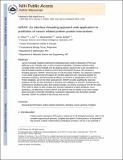| dc.contributor.author | Hosur, Raghavendra | |
| dc.contributor.author | Xu, Jinbo | |
| dc.contributor.author | Berger, Bonnie | |
| dc.contributor.author | Bienkowska, Jadwiga R. | |
| dc.date.accessioned | 2015-09-17T17:56:44Z | |
| dc.date.available | 2015-09-17T17:56:44Z | |
| dc.date.issued | 2010-12 | |
| dc.date.submitted | 2010-11 | |
| dc.identifier.issn | 00222836 | |
| dc.identifier.issn | 1089-8638 | |
| dc.identifier.uri | http://hdl.handle.net/1721.1/98591 | |
| dc.description.abstract | Current homology modeling methods for predicting protein–protein interactions (PPIs) have difficulty in the “twilight zone” (< 40%) of sequence identities. Threading methods extend coverage further into the twilight zone by aligning primary sequences for a pair of proteins to a best-fit template complex to predict an entire three-dimensional structure. We introduce a threading approach, iWRAP, which focuses only on the protein interface. Our approach combines a novel linear programming formulation for interface alignment with a boosting classifier for interaction prediction. We demonstrate its efficacy on SCOPPI, a classification of PPIs in the Protein Databank, and on the entire yeast genome. iWRAP provides significantly improved prediction of PPIs and their interfaces in stringent cross-validation on SCOPPI. Furthermore, by combining our predictions with a full-complex threader, we achieve a coverage of 13% for the yeast PPIs, which is close to a 50% increase over previous methods at a higher sensitivity. As an application, we effectively combine iWRAP with genomic data to identify novel cancer-related genes involved in chromatin remodeling, nucleosome organization, and ribonuclear complex assembly. iWRAP is available at http://iwrap.csail.mit.edu. | en_US |
| dc.description.sponsorship | National Institutes of Health (U.S.) (Grant 1R01GM081871) | en_US |
| dc.language.iso | en_US | |
| dc.publisher | Elsevier | en_US |
| dc.relation.isversionof | http://dx.doi.org/10.1016/j.jmb.2010.11.025 | en_US |
| dc.rights | Creative Commons Attribution-Noncommercial-NoDerivatives | en_US |
| dc.rights.uri | http://creativecommons.org/licenses/by-nc-nd/4.0/ | en_US |
| dc.source | PMC | en_US |
| dc.title | iWRAP: An Interface Threading Approach with Application to Prediction of Cancer-Related Protein–Protein Interactions | en_US |
| dc.type | Article | en_US |
| dc.identifier.citation | Hosur, Raghavendra, Jinbo Xu, Jadwiga Bienkowska, and Bonnie Berger. “iWRAP: An Interface Threading Approach with Application to Prediction of Cancer-Related Protein–Protein Interactions.” Journal of Molecular Biology 405, no. 5 (February 2011): 1295–1310. | en_US |
| dc.contributor.department | Massachusetts Institute of Technology. Computer Science and Artificial Intelligence Laboratory | en_US |
| dc.contributor.department | Massachusetts Institute of Technology. Department of Materials Science and Engineering | en_US |
| dc.contributor.department | Massachusetts Institute of Technology. Department of Mathematics | en_US |
| dc.contributor.mitauthor | Hosur, Raghavendra | en_US |
| dc.contributor.mitauthor | Xu, Jinbo | en_US |
| dc.contributor.mitauthor | Bienkowska, Jadwiga R. | en_US |
| dc.contributor.mitauthor | Berger, Bonnie | en_US |
| dc.relation.journal | Journal of Molecular Biology | en_US |
| dc.eprint.version | Author's final manuscript | en_US |
| dc.type.uri | http://purl.org/eprint/type/JournalArticle | en_US |
| eprint.status | http://purl.org/eprint/status/PeerReviewed | en_US |
| dspace.orderedauthors | Hosur, Raghavendra; Xu, Jinbo; Bienkowska, Jadwiga; Berger, Bonnie | en_US |
| dc.identifier.orcid | https://orcid.org/0000-0003-2598-3552 | |
| dc.identifier.orcid | https://orcid.org/0000-0002-2724-7228 | |
| mit.license | PUBLISHER_CC | en_US |
| mit.metadata.status | Complete | |
